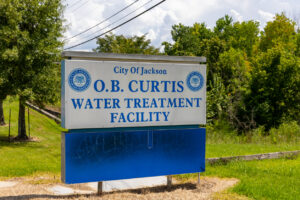<< Back to Media
Water Crisis in Jackson, Mississippi
April 17, 2023
Each day, looming water crises hit closer to home for many Americans. A megadrought in the Southwest, access to clean water in U.S. cities, water contamination, and livestock and crop loss caused by drought increasingly affect citizens in multiple U.S. locations, including Jackson, Mississippi. In August 2022, Jackson, Mississippi, entered a state of emergency due to a severely contaminated water supply caused by an outdated and inadequate water treatment system. While Jackson residents have faced water contamination for years due to dying infrastructure, the August emergency declaration signaled the water system was nearing the point of no return. According to the warning, millions of Jackson residents would remain without clean water if the city failed to update the infrastructure quickly.

The flooding of the Pearl River damaged a major pump at the O.B. Curtis Water Plant, Jackson’s main water treatment facility. August 30, 2022.
Also, excessive rain caused the nearby Pearl River to flood, worsening the August 2022 crisis. Overwhelmed by the flooding, Jackson’s water treatment facility ceased to function. The Associated Press reported that “most of Jackson lost running water for several days, and people had to wait in lines for water to drink, cook, bathe, and flush toilets.” Compounding the crisis, Jackson residents have lost 5 million gallons of water daily from a broken pipe since 2016.
Federal Assistance for Jackson
To help rebuild Jackson’s aging infrastructure, the U.S. federal government has appropriated $600 million towards upgrading the city’s water system. In addition, the EPA released a notice of funding from President Biden’s Bipartisan Infrastructure Law in late February 2023, allocating $20,904,000 to Mississippi for critical water infrastructure updates. The 2021 Bipartisan Infrastructure Law appropriates over $1 trillion to enhance significant infrastructures, such as public transit, clean energy, roads, bridges, and clean water systems. These critical investments will improve the lives of the citizens of Jackson, expanding access to a clean, safe water source.
President Biden’s Justice40 initiative will also create the right avenues to improve water security and safety in underserved communities like Jackson. The Justice40 initiative began in January 2021 and is delivering “40 percent of the overall benefits of Federal climate, clean energy, affordable and sustainable housing, clean water, and other investments to disadvantaged communities that are marginalized, underserved, and overburdened by pollution.” With agencies operating under the Justice40 parameters, investments and policies improve in cities with issues similar to Jackson’s water crisis. Furthermore, according to the United Nations, investing in climate infrastructure will lead to financial benefits, with four dollars in benefits for every U.S. dollar invested. The expedient but tactical use of allocated funds for each crisis further promotes climate resilience, minimizes adverse environmental effects, and saves federal funds down the road.
The city of Jackson illustrates existing water access and water contamination problems across the U.S. Though the crisis persists, the recent federal funding actions to address the water contamination and infrastructure updates are paramount to sustaining communities, businesses, and U.S. public health. By investing in the city’s infrastructure and engaging in environmental justice initiatives, Jackson can mitigate more significant climate change impacts and improve its resident’s access to clean, safe drinking water.
How WBD is Helping
WBD is well-positioned to help cities like Jackson address water challenges. We consider the social, financial, and environmental aspects in all our decision-making processes. Our approach in working with city governments emphasizes local values — we help our clients develop a plan that supports their unique opportunities and challenges. We emphasize inclusivity to ensure viewpoints from diverse perspectives are considered and that historically underserved communities and ones most affected by climate impacts benefit from a plan’s goals and objectives.
WBD helps city governments identify grants that align with a community’s climate resilience needs and project goals and ensure efficiency throughout the application process. For Kansas City, Missouri, our team managed the city’s COVID-19 response during a crisis. We offer customer support from pre-award to post-award — throughout the grant administration process. The financial and grant management experts at WBD have developed proprietary tools and methods to administer and monitor municipal funds and provide guidance for forthcoming grant opportunities. For our international clients, WBD experts have worked alongside African, Latin American, and Southeast Asian government officials to develop clean and sustainable solutions for their energy, resource, and infrastructure needs. Wherever the need arises, WBD has broad capabilities to help our clients make better decisions.
Author: Rachel Moline, M.A., Senior Associate Consultant at Washington Business Dynamics, supports the firm’s Federal Emergency Management Agency (FEMA) award and assists WBD’s contract with the United States Forest Service.
